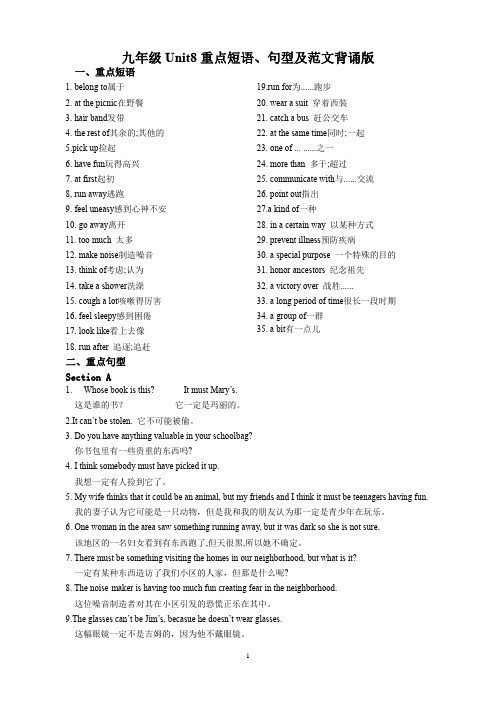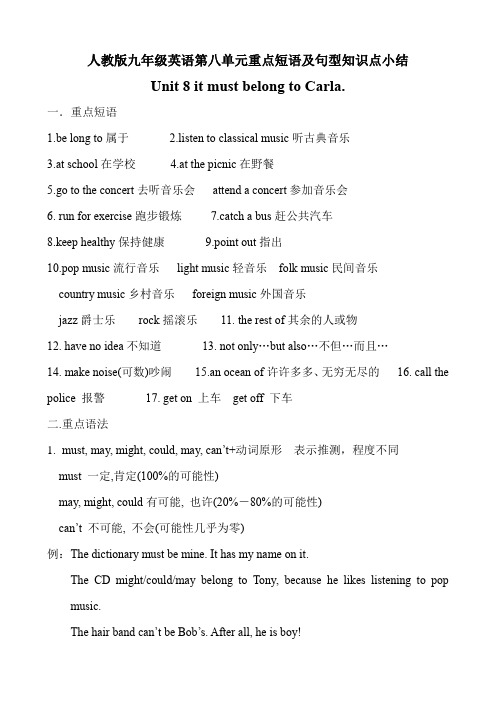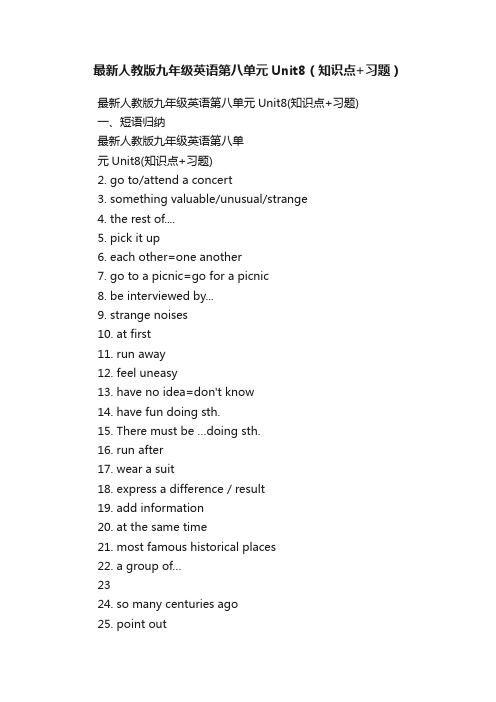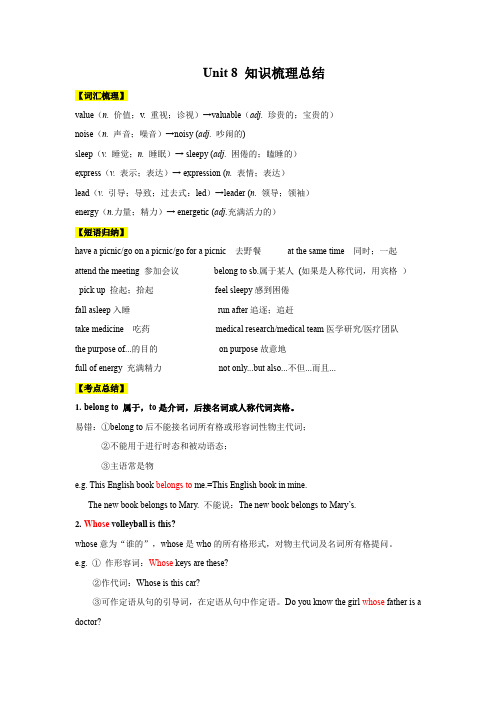最新人教版 九年级第八单元 常见短语及知识点总结
九年级人教版英语8单元知识点及重点句型

九年级英语Unit 8短语动词小结常见短语动词结构有下面几种:1.动词+副词如:give up 放弃 turn off 关掉 stay up 熬夜这种结构有时相当于及物动词,如果其宾语是代词,就必须放在动词和副词之间,如果是名词,则既可插在动词和副词之间,也可放在短语动词后。
2. 动词+介词如:listen of 听 look at 看 belong to 属于这种结构相当于及物动词,后面跟宾语。
3. 动词+副词+介词如:come up with 提出,想出run out of 用完,耗尽 4. 动词+名词(介词) 如:take part in参加 catch hold of 抓住 1.cheer (sb.) up 使(某人)高兴、振作如:cheer me up 使我高兴 clean up 打扫 clean-up n. 打扫2. homeless adj. 无家可归的 a homeless boy 一个无家可归的男孩 home n. 家3. hand out 分发 hand out bananasgive out 分发 give out sth to sb. 分….给某人 give up doing 放弃… give up smoking 放弃吸烟give away 赠送捐赠 give away sth. to …. give away money to kid s give sb. sth. 给某人某东西 give me money 给我钱 give sth. to sb. 给某人某东西 give money to me 给我线 4. sick adj. 生病的作表语、定语ill adj. 生病的作表语,不能作定语 5. volunteer to do v. 志愿效劳、主动贡献 volunteer n. 志愿者6. come up with 提出想出 === think up 想出 catch up with 赶上追上 7. put off doing 推迟做某事 put on 穿上 (指过程) put up 张贴8. write down 写下记下9. call up 打电话 make a telephone call 打电话10. set up 成立建立The new hospital was set up in 2000. 这座医院是在2000年成立的。
人教版九年级8单元背诵版

九年级Unit8重点短语、句型及范文背诵版一、重点短语1. belong to属于2. at the picnic在野餐3. hair band发带4. the rest of其余的;其他的5.pick up捡起6. have fun玩得高兴7. at first起初8, run away逃跑9. feel uneasy感到心神不安10. go away离开11. too much 太多12. make noise制造噪音13. think of考虑;认为14. take a shower洗澡15. cough a lot咳嗽得厉害16. feel sleepy感到困倦17. look like看上去像18. run after 追逐;追赶19.run for为......跑步20. wear a suit 穿着西装21. catch a bus 赶公交车22. at the same time同时;一起23. one of ... ......之一24. more than 多于;超过25. communicate with与......交流26. point out指出27.a kind of一种28. in a certain way 以某种方式29. prevent illness预防疾病30. a special purpose 一个特殊的目的31. honor ancestors 纪念祖先32. a victory over 战胜......33. a long period of time很长一段时期34. a group of一群35. a bit有一点儿二、重点句型Section A1.----Whose book is this? ----It must Mary’s.这是谁的书?它一定是玛丽的。
2.It can’t be stolen. 它不可能被偷。
3. Do you have anything valuable in your schoolbag?你书包里有一些贵重的东西吗?4. I think somebody must have picked it up.我想一定有人捡到它了。
人教版九年级英语第八单元重点短语及句型知识点小结

人教版九年级英语第八单元重点短语及句型知识点小结Unit 8 it must belong to Carla.一.重点短语1.be long to属于2.listen to classical music听古典音乐3.at school在学校4.at the picnic在野餐5.go to the concert去听音乐会attend a concert参加音乐会6. run for exercise跑步锻炼7.catch a bus赶公共汽车8.keep healthy保持健康9.point out指出10.pop music流行音乐light music轻音乐folk music民间音乐country music乡村音乐foreign music外国音乐jazz爵士乐rock摇滚乐11. the rest of其余的人或物12. have no idea不知道13. not only…but also…不但…而且…14. make noise(可数)吵闹15.an ocean of许许多多、无穷无尽的16. call the police 报警17. get on 上车get off 下车二.重点语法1.must, may, might, could, may, can’t+动词原形表示推测,程度不同must 一定,肯定(100%的可能性)may, might, could有可能, 也许(20%-80%的可能性)can’t 不可能, 不会(可能性几乎为零)例:The dictionary must be mine. It has my name on it.The CD might/could/may belong to Tony, because he likes listening to pop music.The hair band can’t be Bob’s. After all, he is boy!2.当play 指弹奏乐器时,常在乐器前用定冠词play the guitar play the piano play the violin当play 指进行球类运动时,则不用定冠词play football play basketball play baseball3. try to do sth.尝试做某事try/do one’s best to do sth. 尽某人的最大努力去做某事例:I try to climb the tree.He tried his best to run.4.escape from …从哪里逃跑出来例:He escaped from the burning building.5. 辨析because of , becausebecause of +名词/代词/名词性短语because +从句例:I do it because I like it. 我做这件事是因为我喜欢。
最新人教版九年级英语第八单元Unit8(知识点+习题)

最新人教版九年级英语第八单元Unit8(知识点+习题)最新人教版九年级英语第八单元Unit8(知识点+习题)一、短语归纳最新人教版九年级英语第八单元Unit8(知识点+习题)2. go to/attend a concert3. something valuable/unusual/strange4. the rest of....5. pick it up6. each other=one another7. go to a picnic=go for a picnic8. be interviewed by...9. strange noises10. at first11. run away12. feel uneasy13. have no idea=don't know14. have fun doing sth.15. There must be …doing sth.16. run after17. wear a suit18. express a difference / result19. add information20. at the same time21. most famous historical places22. a group of…2324. so many centuries ago25. point out26. on midsummer's morning27. the center of ... ……28. move up最新人教版九年级英语第八单元Unit8(知识点+习题)1. belong to 属于(=be)It must belong to Carla. = It must be Carla's.※练一练① The notebook must be my friend's.(同义句)The notebook must __________ _______ my friend.② The book must be Jim's.(否定句)The book _________ ________ Jim's.③ The book on the ch air must belong to ________. Her name is on the cover.A. herB. hersC. sheD. him2. attend a concert参加音乐会(go to concert 去听音乐会)【比较应用】attend主要指以观众或听众的身份参加婚礼,丧礼,会议或讲座或上课. join in参加某项活动,尤指参加正在进行的活动.join 参加某个组织、党团、俱乐部等机构,成为其中一员.take part in参加某些活动或工作,在其中起了作用.(可和join in 互换)※练一练Mr. John invited many friends to _______ his wedding.A. take part inB. joinC. join in D attend3. anything valuable贵重的东西当形容词修饰something,anything,nothing,everything等复合不定代词时,后置.something unusual anything strange nothing important※练一练In this book,you can learn________.A. something educationalB. educational somethingC. anything educationalD. educational anything4. the rest of my friends 我剩下的朋友the rest of... (剩余的……)作主语,谓语动词的单复数由of 后边的名词决定.※练一练①The rest of the books_____dull.②The rest of oil _____not enough.5. ...must have picked it up. ……一定是捡起它了.⑴must have done sth(过去一定做某事了)表示对过去的事情的推测⑵pick up捡起(代词放中间)※练一练When he saw a wallet on the ground,he _______ at once.A. picked it upB. gave it upC. picked up itD. worked it out6. happen与take place 发生(无被动式)⑴ happen 特别指那些偶然或未能预见的事件发生.Sth. happened to sb.某人发生了某事Sb. happened to do sth.某人碰巧做某事⑵ take place 指某事按计划进行或按计划发生.★take place有“举行”之意,而happen有“碰巧”的意思.※练一练①A strange thing happened _____ her last night,so she is afraid to stay at home alone tonight.A. atB. forC. withD. to②Great changes _________________(发生)in China since the last thirty years.③The meeting _________________(举行)next Friday.④ _________________(碰巧)that I had no money on me.7. There must be something visiting the homes. 一定有什么东西光顾这些住户.⑴There be+主语+doing sth.有某人(物)正在做某事(表存在)There are some people surfing on the sea,aren't there?There is a cat eating fish in the corner.⑵There must be +主语+doing 一定有某人(物)正在做……(对某种存在的推测)There must be someone playing the violin there. 准有人在那里拉小提琴.※练一练①There _____________________________________________ in the forest.一定有人在森林里砍树.②There _______________________________ in the tree.树上有只鸟儿在唱着歌.8. feel sleepy 感动困乏sleepy adj. 困乏的,昏昏欲睡的sleepy expression(懒洋洋的表情)asleep adj. 睡着的(表语形容词)fall/be asleep①In spring,people often feel_________(sleep)②I didn't have a good_____ last night,so I was ______ and I fell _____ in class.A. sleep; asleep; sleepB. asleep; sleep; sleepyC. sleep; sleepy; asleepD. sleepy; sleep; asleep9. ...not only one of Britain's most famous historical places but also one of its greatest mysteries.⑴not only... but also...不但……而且……⑵either... or... 要么……要么……;不是……就是……(两者选择其一)⑶neither... nor...既不……也不……(两者都不)⑷both... and... ……和……(两者)都这四组连词都可以用来连接两个性质相同的并列成分,作主语、谓语、宾语或表语等,但⑴⑵⑶在连接句子主语时,谓语动词采取“就近原则”.both... and... 连接两个主语时,谓语动词通常用使用复数形式.Neither he or she works here. 他和她都不在这里工作.(主语)你要么跟我一块去,要么走回家去.(谓语)I have neither time nor money. 我既没时间也没钱.(宾语)He is not only a teacher,but also an actor. 他不仅是一名教师,也是一位演员.(表语)Either you or I am wrong. 不是你错就是我错.(表语)You may stay either in a hotel or in a private house. 你可以住在饭店或私人的家里.(地点状语)g back either today or tomorrow. 她不是今天来就是明天来.(时间状语)※练一练①Both my father and my mother _____(be )teachers hard.②-I hear _____ your father _____ your mother likes watchingBeijing Opera.-Yes,they both love it very much.A. both; andB. either; orC. Neither; norD. not only; but also③Not only my friends but also I _____ interested in football and Messi is our favorite star.A. beB. amC. isD. are④ Would you like some juice or coffee?-_____ is OK. I really don't care.A. BothB. EitherC. NeitherD. All⑤ Both Tom and Lucy like music that is relaxing. (改为否定句)______ T om______ Lucy ______ music that is relaxing.⑥ Would you like s ome juice or coffee?-______. I really don't mind.A. EitherB. NeitherC. Both D All★not only … but also连接两个分句时,not only可用于句首,第一个从句主谓要倒装.Not only is he clever,but also he is hard working.10. ... another popular idea. 另一个受欢迎的主意.【迷津点拨】other,the other,others,the others,another⑴ other adj.别的,其他的pron. 其余的(人或事物)Do you have any other question(s)?We need to help each other.⑵ the other特指两者中的另一个.经常构成:one... the other...(the other = the other +单数名词)He has two daughters. One is a nurse,the other is a worker.⑶others 特指某一范围内的人或物除去一些外,剩下部分中的另一些(不是全部).经常构成:some... others... ,others...Some of us like singing and dancing,others like sports,others like....有时也泛指其他的人或物:We must help others.(我们必须帮助别人.)⑷ the others 特指某集体中除了一个(些)后,剩下的部分(全部).the others = the other +复数名词Two boys will go to the zoo,and the others will stay at home.⑸ another 泛指同类事物中(三者或三者以上或数量不明)另一个.经常构成: one... another... ,another...(another = another +单数名词)I don't like this one. Please show me another.★表示“再、又,还”时:another +基数词+名词复数=基数词+ more +名词复数I'll be here for another two weeks/two more weeks.※练一练① These cakes are very delicious,I want to have_____ one.A. otherB. the otherC. othersD. another②Many people are in the zoo. Some are watching animals,and ______ are taking photos.A. the otherB. the othersC. othersD. another.③New Zealand has two islands. One is North Island and ______ is South Island.A. anotherB. the other C other D. the others11. 含有way的短语in the way 妨碍;挡道in the way of 防碍……in a certain way 按一定的方法in a/some way(s) 在某方面,在某种程度(意义)上,以某种方式by the way 顺便说一下on the way(to.. )在(去……)的路上go out of one's way 格外努力※练一练The car is _____,can you park it to another place?A. in the wayB. by the wayC. in the endD. in style12. ...prevent illness and keep people healthy. 预防疾病和保持人们健康.prevent sb. (from) doing sth. =stop sb. (from) doing sth.★keep sb. doing让某人一直做某事※练一练①Plants prevent the sun from ____________(make)the earth drier.②The heavy rainstorm stopped him from returning. (同义句)The heavy rainstorm ___________ him _______ ______________.③She closed the gate to prevent the dog ____ going out of the garden.A. atB. onC. ofD. from13. ...it receives more than 750,000 visitors.receive 收到;接到(被动)accept 接受;接纳(主动)He received the present,but he didn't accept it. 他收到了礼物,但没有接受. ※练一练①On her birthday ,she ____ a gift from a boy,but she didn't _____ it.A. received ,receiveB. accepted ; acceptC. received ; acceptD. accepted ; receive②His family are worried about him because they haven't _______ letters from him for a long time.A. acceptedB. receivedC. writtenD. collected三、语法回顾(肯定猜测和否定猜测)⑴must一定,肯定(可能性100%,疑问、否定用can,can't)⑵may/could可能,也许(可能性50%,疑问否定用could,couldn't)⑶ might有可能,差不多(可能性30%)※练一练① Whose T-shirt is this?-It_______ be John's. It's ________small for himA. can't ; much tooB. can't; too muchC. mustn't ; too muchD. mustn't ; much too② I hear that Bob is in hospital. He ______be ill.A. mustB. shouldC. wouldD. can't③ This could be Robert's basketball.(提问)_________ basketball _________ this _______?四、课后作业作业①:习题单项选择.一、( )31. — Tony is ________ man.— Yes. He is the tallest in his class.A. quite a tallB. a quite tallC. quite tall aD. tall a quite( )32. — ________ books are these?— I am not sure. They may belong to Peter.A. WhichB. WhoC. WhoseD. Whom( )33. —The famous star was interviewed ______ the local newspaper.— Yes,I also heard the news.A. ofB. byC. asD. with( )34. —What’s Lily’s favorite color?— _____.A. PianoB. PandaC. PieD. Pink( )35. —Don’t throw these books. They may be ________ to you.—OK. I won’t.A. convenientB. awfulC. valuableD. useless( )36. — Carl,________ are you late for school?— Because my bike is broken.A. whyB. whenC. howD. where( )37. There are ________ stars in the sky.A. millionsB. millions ofC. million( )38. — Did you _________ the letter from your pen pal?— No,I didn’t.A. avoidB. reportC. writeD. receive( )39. — Edison was one of _______ inventors in the world.—Yes,I agree.A. the greaterB. greaterC. the greatestD. greatest( )40. — Can he help us?—I’m not sure. He ________ help us solve this mystery.A. mightB. mustC. shouldn’tD. mustn’t( )41. — The visitors knew little about the island when they ________ there.— Really? What did they do first?A. arriveB. have arrivedC. would arrive( )42. — He has never seen the movie,________?— No,he hasn’t.A. is heB. has heC. isn’t heD. hasn’t he( )43. Not only you but also he _______ on well with the new students.A. getB. gettingC. getsD. to get( )44. I hear ________ he will be back in two days.A. thatB. whereC. ifD. when( )45. — Whose baseball is this?— ________ He loves baseball.A. So do I.B. I enjoy playing baseball.C. I don’t know.D. It must be Nick’s.二、完形填空.Justin and Mary woke up early. 46 told them about a monster that haunted (怪兽出没) the lake D. tall a quite D. million of D. arrived yesterday. It was only 5:00 AM,so 47 else in the house was still asleep. Mary and Justin went to the boat dock (码头). It was too foggy (有雾的) to 48 anything. Do you think Uncle Thomas was just trying to scare (惊吓) us?” Justin said. Mary said,“ 49 what he said? The monster haunts the lake. The people in the story were in 50 .” “You want to go out on the water? Mom will be angry,” Justin said. “Maybe we don’ t have togo anywhere. We 51 sit in the boat while it’ s docked (停靠码头). That would be safe,” Mary said. Justin carefully climbed into the boat first. Then Mary climbed into the boat and sat 52 him. They looked around,and gradually,the sun began to rise. Mary suddenly shouted,“The monster!” They hugged each other in fear,but then they heard a laugh. Justin realized something and said,“Uncle Thomas?” “I knew that you would get up 53 because of my story,” Uncle Thomas said. Mary and Justin were 54 that there was no monster after all. Uncle Thomas laughed,“I brought 55 for us. Are you hungry?” “Yes,we are. Let’s have breakfast,” Mary and Justin said.( )46. A. Uncle Thomas B. Their mother C. Their father D.Their teacher ( )47. A. everything B. anything C. everyone D. nothing ( )48. A. feel B. catch C. hear D. see( )49. A. Remember B. Imagine C. Attend D. Receive( )50. A. buses B. trains C. boats D. planes( )51. A. must B. mustn’t C. couldn’t D. can( )52. A. beside B. outside C. of D. for D. for( )53. A. slowly B. suddenly C. early D. late( )54. A. happy B. sad C. nervous D. afraid( )55. A. lunch B. breakfast C. supper D. pocket三、阅读理解.I was woken up by a strange sound. I was terrified and ran downstairs. I found my mom in the kitchen,getting my brother ready for school. “Mom,did you hear anything? I,uh,I thought I saw an alien.” D. In 1898. Just a dream!” Mom answered. As I walked to the window,I cried. I saw a little alien with big and black eyes. It tried to run between my legs. Although I was scared,for some reason,I squeezed (挤) my legs together in time to catch it. It took out something and hurt me.I felt a terrible sense of nothingness and fainted (晕倒). Then I woke up. At first,I could hardly move. I wasn’t sure whether I had had a dream or not. I stood up and walked downstairs. I saw my mom in the kitchen. She was really getting my brother ready for school,wearing her pink clothes. Then I realized it was just a dream because in my dream she was wearing her work clothes. From then on,I always dreamt about aliens. At that time,I really thought maybe I had some kind of relationship (关系) with aliens. Later I realized that I used to have those dreams because I always read books or watched TV programs about aliens!( )61. What did the writer do when he saw the alien?A.He was too scared to move.B.He knew it was a dream and w asn’t afraid.C. He was so scared that he fainted.D. He wanted to catch the alien. ( )62. The underlined word “nothingness” in the passage means “________” in Chinese.A. 虚无B. 无奈C. 兴奋D. 开心( )63. The writer found that it was just a dream ______.A. as soon as he woke upB. before he went downstairsC. when he saw his motherD. when he was hurt by the alien( )64. Which of the following is TRUE according to the passage?A.The writer had the dream at noon.B. The writer’s mother’s work clothes might not be pink.C. The writer’s mother was worried about his dream.D. When the writer had the dream,his family were out.( )65. Why did the writer use to have dreams about aliens?A. He had some kind of relationship with aliens.B. He was terribly ill.C. He maybe did something about aliens before going to bed .D. The dreams were all about the writer’s real experiences.。
Unit8笔记人教版英语九年级全册

Unit 8 知识梳理总结【词汇梳理】value(n.价值;v. 重视;诊视)→valuable(adj.珍贵的;宝贵的)noise(n.声音;噪音)→noisy (adj. 吵闹的)sleep(v.睡觉;n.睡眠)→ sleepy (adj. 困倦的;瞌睡的)express(v.表示;表达)→ expression (n. 表情;表达)lead(v.引导;导致;过去式:led)→leader (n. 领导;领袖)energy(n.力量;精力)→ energetic (adj.充满活力的)【短语归纳】have a picnic/go on a picnic/go for a picnic 去野餐at the same time 同时;一起attend the meeting 参加会议belong to sb.属于某人(如果是人称代词,用宾格)pick up 捡起;拾起feel sleepy感到困倦fall asleep入睡run after追逐;追赶take medicine 吃药medical research/medical team医学研究/医疗团队the purpose of...的目的on purpose故意地full of energy 充满精力not only...but also...不但...而且...【考点总结】1.belong to 属于,to是介词,后接名词或人称代词宾格。
易错:①belong to后不能接名词所有格或形容词性物主代词;②不能用于进行时态和被动语态;③主语常是物e.g. This English book belongs to me.=This English book in mine.The new book belongs to Mary. 不能说:The new book belongs to Mary’s.2.Whose volleyball is this?whose意为“谁的”,whose是who的所有格形式,对物主代词及名词所有格提问。
人教版九年级英语第8-10单元重要知识点

九年级英语Unit 8短语动词小结常见短语动词结构有下面几种:1.动词+副词如:give up 放弃turn off 关掉stay up 熬夜这种结构有时相当于及物动词,如果其宾语是代词,就必须放在动词和副词之间,如果是名词,则既可插在动词和副词之间,也可放在短语动词后。
2. 动词+介词如:listen of 听look at 看belong to 属于这种结构相当于及物动词,后面跟宾语。
3. 动词+副词+介词如:come up with 提出,想出run out of 用完,耗尽4. 动词+名词(介词)如:take part in参加catch hold of 抓住1.cheer (sb.) up 使(某人)高兴、振作如:cheer me up 使我高兴clean up 打扫clean-up n. 打扫2. homeless adj. 无家可归的 a homeless boy 一个无家可归的男孩home n. 家3. hand out 分发hand out bananasgive out 分发give out sth to sb. 分….给某人give up doing 放弃…give up smoking 放弃吸烟give away 赠送捐赠give away sth. to …. give away money to kidsgive sb. sth. 给某人某东西give me money 给我钱give sth. to sb. 给某人某东西give money to me 给我线4. sick adj. 生病的作表语、定语ill adj. 生病的作表语,不能作定语5. volunteer to do v. 志愿效劳、主动贡献volunteer n. 志愿者6. come up with 提出想出=== think up 想出catch up with 赶上追上7. put off doing 推迟做某事put on 穿上(指过程)put up张贴8. write down 写下记下9. call up 打电话make a telephone call 打电话10. set up成立建立The new hospital was set up in 2000. 这座医院是在2000年成立的。
新人教版九年级unit8必背词组及句子必背词组

新人教版九年级u n i t8必背词组及句子必背词组(总11页)--本页仅作为文档封面,使用时请直接删除即可----内页可以根据需求调整合适字体及大小--新人教版九年级unit 8必背词组及句子必背词组to… 属于…only little kid 唯一的小孩子the picnic 在野餐writer 最喜爱的作家a concert 出席音乐会music hall 音乐厅hair band 粉红的发带to a picnic去野餐rest of … 其余的,剩下的……up 把…拾起来noises 奇怪的声音our windows 在我们的窗外neighbor 隔壁邻居uneasy 感到不安sleepy感到困倦our neighborhood 在我们周围no idea= don’t know 不知道noise-maker 噪声制造者trouble-maker 麻烦制造者fear 制造恐怖to the pool =go swimming 去游泳the laboratory 在实验室water running 听到水流的声音the sun rising 看太阳升起the longest day of the year 在一年中最长的那天 a lot 咳得很厉害rock circle 石头圆环historical places 著名的历史地方leaders 古代首领with the gods 与神交流in / at…=reach…= get to… 到达…out 指出popular idea 另一个流行的观点kind of calendar 一种日历kind of afraid 看起来有点害怕put together 被放在一起a certain way 以某种方式a medical purpose 蕴含着医疗目的illness 阻止疾病people healthy 保证人们健康position of the stones 这些石头的位置a special purpose 因为特别的目的burial place 墓葬之地place to honor ancestors祭拜/ 缅怀祖先的地方a victory over an enemy 庆祝战胜敌人的胜利a long period of time 经历很长时期以后of the greatest mysteries 最大的迷团之一group of English volunteers 一群英国志愿者bright light 那道亮光a bit late for…迟到一点点to somebody on the phone 和某人通电话work 在工作now 现在truck 玩具卡车on the tennis team 在网球队the street 沿着街道the sky在空中after…追…woman with a camera 一个拿着相机的女人a movie 制作电影prevent somebody from doing something 阻止某人做…valuable/ strange/ else 值价的/ 奇怪的/ 另外的东西unusual 不同寻常的东西away 离开必背句式(本单元核心语法——用情态动词表推测)--- Whose volleyball is this --- It must belong to Carla.--- Whose hair band is this --- It could be Mei’s hair band. Or it might belong to Linda. They both have long hair.--- What did you see that night--- I’m not sure, but it can’t be a dog. It was bigger. I think it might be a bear or a wolf.I think somebody must have picked it up.So it can’t be stolen.So could it still be at the parkWhat could it beThere must be something visiting the homes in our neighborhood.必背句子wife thinks that it could be an animal, but my friends and I thinkit must be teenagers having fun.我妻子认为那可能是一头动物,但我的朋友们和我都认为那一定是小青年在搞怪。
九年级上册英语八单元知识点总结

九年级上册英语八单元知识点总结一、重点单词。
1. whose.- 意为“谁的”,是一个疑问代词,用于询问所属关系。
例如:Whose book is this?(这是谁的书?)- 它还可以引导定语从句,在从句中作定语。
例如:I know the girl whose mother is a doctor.(我认识那个女孩,她的妈妈是医生。
)2. truck.- 名词,“卡车;货车”。
例如:A truck is coming.(一辆卡车正开过来。
)3. picnic.- 名词,“野餐”。
常用短语有go for a picnic(去野餐)。
例如:We are going for a picnic this Sunday.(这个星期天我们打算去野餐。
)- 也可作动词,意为“去野餐”。
例如:They picnicked in the park last weekend.(他们上周末在公园野餐了。
)4. rabbit.- 名词,“兔子”。
例如:The rabbit is very cute.(这只兔子很可爱。
)5. attend.- 动词,“出席;参加”,主要指参加会议、婚礼、葬礼、典礼等比较正式的活动。
例如:He will attend the meeting tomorrow.(他明天将参加会议。
)- 还可表示“上学;上课”。
例如:He attends school every day.(他每天上学。
)6. valuable.- 形容词,“很有用的;宝贵的”。
例如:Time is valuable.(时间是宝贵的)。
- 名词形式为“value”,意为“价值;重要性”。
例如:What is the value of this painting?(这幅画的价值是多少?)7. pink.- 名词,“粉红色”;形容词,“粉红色的”。
例如:She likes pink.(她喜欢粉红色。
) Her dress is pink.(她的裙子是粉红色的。
- 1、下载文档前请自行甄别文档内容的完整性,平台不提供额外的编辑、内容补充、找答案等附加服务。
- 2、"仅部分预览"的文档,不可在线预览部分如存在完整性等问题,可反馈申请退款(可完整预览的文档不适用该条件!)。
- 3、如文档侵犯您的权益,请联系客服反馈,我们会尽快为您处理(人工客服工作时间:9:00-18:30)。
最新人教版九年级第八单元常见短语及知识点总结
Unit 8 it must belong to Carla.
一.重点短语
1.be long to属于
2.listen to classical music听古典音乐
3.at school在学校
4.at the picnic在野餐
5.go to the concert去听音乐会attend a concert参加音乐会
6. run for exercise跑步锻炼
7.catch a bus赶公共汽车
8.keep healthy保持健康9.point out指出
10.pop music流行音乐light music轻音乐folk music民间音乐country music乡村音乐foreign music外国音乐
jazz爵士乐rock摇滚乐11. the rest of其余的人或物
12. have no idea不知道13. not only…but also…不但…而且…
14. make noise(可数)吵闹15.an ocean of许许多多、无穷无尽的
16. call the police 报警17. get on 上车get off 下车
二.重点语法
1.must, may, might, could, may, can’t+动词原形表示推测,程度不同must 一定,肯定(100%的可能性)
may, might, could有可能, 也许(20%-80%的可能性)
can’t 不可能, 不会(可能性几乎为零)
例:The dictionary must be mine. It has my name on it.
The CD might/could/may belong to Tony, because he likes listening to pop music.
The hair band can’t be Bob’s. After all, he is boy!
2.当play 指弹奏乐器时,常在乐器前用定冠词
play the guitar play the piano play the violin
当play 指进行球类运动时,则不用定冠词
play football play basketball play baseball
3. try to do sth.尝试做某事
try/do one’s best to do sth. 尽某人的最大努力去做某事
例:I try to climb the tree.
He tried his best to run.
4.escape from …从哪里逃跑出来
例:He escaped from the burning building.
5. 辨析because of , because
because of +名词/代词/名词性短语
because +从句
例:I do it because I like it. 我做这件事是因为我喜欢。
I had to move because of my job. 因为工作的原因我得搬家。
6. anything strange 一些奇怪的东西
当形容词修饰something, anything, nothing, everything等不定代词时,放在这些词的后面
7. there be sb./ sth. doing
例:There is a cat eating fish.
There must be something visiting our home.
8. look for 寻找指过程find 找到指结果
例:I am looking for a pen. 我正在找一支笔。
(指找的过程)
I found my pen just now. 我刚刚找到了我的笔。
(指找的结果)
9. hear 听指听的结果
listen 听指听的过程如:
例:Did you hear ? 你听到了吗?(指听的结果,听或没听到)
I often listen to the music. 我经常听音乐。
(指听的过程)
10. take place 常指“(某事)按计划进行或按计划发生”(二者都无被动) happen常指具体事件的发生,特别指那些偶然或未能预见的“发生”例:Great changes have taken place in China since.
New things are happening all around us.
take place还有“举行”之意。
例:The meeting will take place next Friday.
happen还可表示“碰巧;恰好”之意
例:It happened that I had no money on me.。
